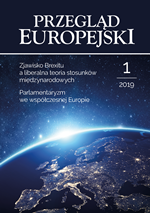Znaczenie modelu westminsterskiego w kształtowaniu się pozycji ustrojowej parlamentu w Papui-Nowej Gwinei
The importance of the Westminster model in shaping the political position of the parliament in Papua New Guinea.
Author(s): Justyna Eska-MikołajewskaSubject(s): Politics / Political Sciences, Political Sciences
Published by: Wydawnictwa Uniwersytetu Warszawskiego
Keywords: parliament; Papua New Guinea; Westminster model
Summary/Abstract: The article presents the issues of the political position of the parliament in one of the largest statesof the South Pacific subregion – Papua New Guinea. Shaping its legal and political system, the stateprofoundly derived from the British practice. This process was initiated in the first decade of the 20thcentury as a result of Australian rule, which had lasted by that time the state gained its independencein 1975. As a consequence, all the basic features of Westminster democracy were adopted, with theunitary form of government and the unicameral parliament. The analysis allowed to indicate that thecharacter of Papuan democracy has evolved over the years, and therefore some elements of theWestminster model have become inadequate and not very effective. These changes concerned mainly superior state structures, including the parliament. It is a body increasingly controlled by theexecutive nowadays, that lost its original representative character. In this article, the author has adopted the following research methods: an analysis of legal sources and a critical analysis as well asa descriptive method. The text was divided into three main parts, the introduction and the conclusion.
Journal: Przegląd Europejski
- Issue Year: 2019
- Issue No: 1
- Page Range: 37-56
- Page Count: 20
- Language: Polish

